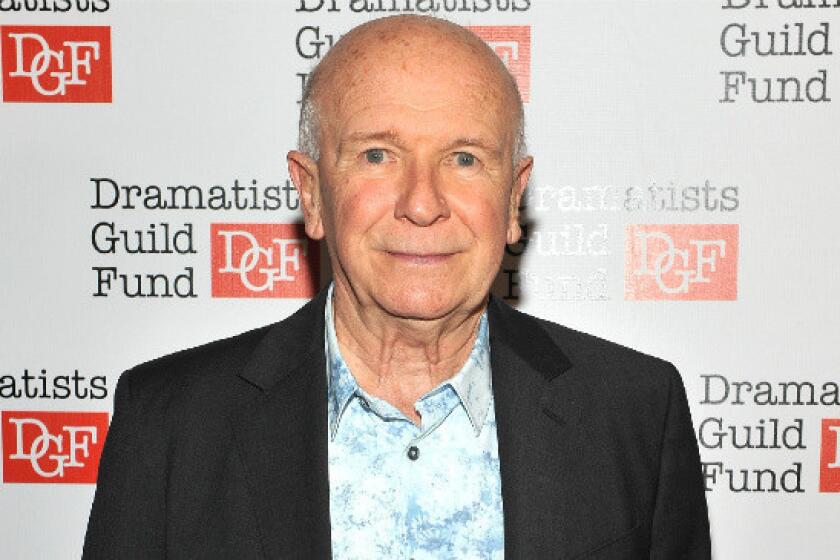Playwright Terrence McNally, 81, dies of coronavirus-related complications
- Share via
Terrence McNally, whose long, varied and prolific career as a playwright, musical librettist and screenwriter earned him five Tony Awards and an Emmy, died Tuesday. He was 81.
McNally, once referred to as “the quintessential man of the theater” by actress Zoe Caldwell, died from complications related to the coronavirus, his publicist Matt Polk said. He was diagnosed with lung cancer in 2001 and twice underwent surgery.
While most playwrights since World War II have arrived like comets, creating their signature scripts early in their careers, the arc of McNally’s writing life testified to the riches — especially insight, empathy and a hesitance to judge flawed people too harshly — that came with maturity.
“A huge part of me is gone. But then it’s not. Terrence wouldn’t like that,” tweeted Broadway legend Chita Rivera, who worked with McNally on numerous projects, including “Kiss of the Spider Woman.” “He helped to make me who I am as a person. He is the epitome of love and friendship. Only God knows how much I will miss him.”
“Hamilton” creator Lin-Manuel Miranda shared his own tribute on social media: “Heartbroken over the loss of Terrence McNally, a giant in our world, who straddled plays and musicals deftly. Grateful for his staggering body of work and his unfailing kindness.”
McNally earned his first Broadway writing credit at age 23 and continued steadily from there into his 30s, establishing a reputation as an edgy and talented playwright and farceur who consistently challenged and mocked authority during the Vietnam War era. But McNally’s streak of signature plays — the ones that won him awards and brought him to the front rank of American playwriting — didn’t begin until 1987, the year he turned 48.
“Frankie and Johnny in the Claire de Lune” (1987), “The Lisbon Traviata” (1989), “Lips Together, Teeth Apart,” (1991) “A Perfect Ganesh” (1993), “Love! Valour! Compassion!” (1994) and “Master Class” (1995) may not qualify as landmarks with near-universal recognition and acclaim among theater lovers — as has been the case with the best works of some of McNally’s more famed contemporaries, such as Edward Albee, August Wilson, Tony Kushner, David Mamet and Sam Shepard.
But the plays he wrote during his extended creative high tide were funny, warm, poignant, life-affirming and popular.
In the shadow of the AIDS epidemic, McNally, who was gay and in 2000 lost longtime partner Gary Bonasorte to the disease, met the demands of that critical time with a warmer, more embracing vision than he’d shown in his first quarter-century of work.
He won best-play Tonys in 1995 and 1996. The first was for “Love! Valour! Compassion!,” in which eight gay men spending holiday weekends together one summer under the shadow of AIDS have their bonds tested and affirmed. He won again with “Master Class,” a loving but hardly fawning portrayal of opera diva Maria Callas, which became a meditation on the extreme commitment and sacrifice exacted from those compelled to reach for the greatest artistic heights.
The theater community is mourning Terrence McNally, the 81-year-old Tony-winning playwright who died Tuesday from complications related to the coronavirus.
“When I’m writing, I try not to think in terms of themes,” McNally told the New York Times in 2004. “But I think I write about the difficulty of people connecting as they’re trying to find hope, trying to find their way to real love and commitment.”
McNally disliked being described as a gay playwright, dismissing it as a reductive label, especially since his subject matter was hardly limited to gay life. Still, it was a subject he took on from early in his career, and approached with both anger and tenderness starting in the late 1980s.
“I think I wanted to write about what it’s like to be a gay man at this particular moment in our history,” he wrote in a preface to the published text of “Love! Valour! Compassion!”
“I think I wanted to tell my friends how much they’ve meant to me. I think I wanted to tell everyone else who we are when they aren’t around,” he added. “I think I wanted to reach out and let more people into those places in my heart where I don’t ordinarily welcome strangers.”
Growing up in Corpus Christi, Texas, McNally fell first for opera. After winning notice as a playwright, he became a regular panelist on a quiz show that aired during weekly radio broadcasts of the Metropolitan Opera. McNally’s lifelong love of music, fueled by massive emotion as well as his ability to deal with complex stories, positioned him to write Tony-winning books for two musicals far outside the feel-good, romantic Broadway norm.

“Kiss of the Spider Woman” (1993) adapted Manuel Puig’s novel and stage drama about the unlikely bond between two Latin American cellmates: an apolitical, movie-bedazzled gay man and a heterosexual political prisoner who is a committed revolutionary.
With “Ragtime” (1998), McNally grappled successfully with E.L. Doctorow’s sprawling novel about early 20th century America — a task that required interweaving three different story strands involving a patrician WASP family, a penniless Jewish immigrant who becomes a pioneering filmmaker and the saga of Coalhouse Walker Jr., a proud young black pianist driven to violence by racial injustice.
His fifth Tony would be a lifetime achievement award given in 2019.
McNally won his Emmy for “Andre’s Mother,” a 1990 teleplay he wrote for PBS’ “American Playhouse” series; it expanded upon his short stage piece about a mother who couldn’t accept her son’s homosexuality during life and had to come to terms with it after his death.
At the same time, the playwright was capable of lighter entertainments. He wrote both the stage play and film script for “The Ritz” (1975), a farce about a heterosexual man who hides out in a gay bathhouse when he runs afoul of his murderous, Mafioso brother-in-law. His book for the stage musical version of “The Full Monty” (2000) changed the film’s British backdrop to Buffalo, N.Y., as it told the story about down-on-their-luck working class men who become male strippers to cobble together a living and regain their sense of accomplishment.
If you can know a person by the company he keeps, you can judge a playwright by the talent that sticks by him.
“If “Ragtime” hoped to say something worthwhile as it wanted to be liked, ‘The Full Monty’ only wanted to be liked and dare not say anything much at all,” writer Thomas S. Hischak complained in his book “Boy Loses Girl: Broadway’s Librettists.”
McNally also was questioned in some quarters for allowing traditional Hollywood casting of a beautiful leading lady — Michelle Pfeiffer — opposite Al Pacino in “Frankie and Johnny,” the film version of “Frankie and Johnny in the Claire de Lune.” On stage, Kathy Bates had originated the role of Frankie.
In an interview published in the book “The Playwright’s Art: Conversations With Contemporary American Dramatists,” McNally conceded that as the screenwriter for “Frankie and Johnny” he lacked the casting pull he’d had as the playwright of “Frankie and Johnny in the Claire de Lune.” He had pushed for Bates to play Frankie on film, but wound up pleased with what he considered Pfeiffer’s “much darker ... more painful” take on the character.
While he also wrote the screenplay for a film version of “Love! Valour! Compassion!” McNally always set his theatrical work first, and said the main reason he lived in New York City was to be able to see three or four plays a week and keep tabs on which actors might be right for his shows.
“In Hollywood, it’s `’Take the money and run,’” he mused wryly in a 1995 interview with the Los Angeles Times. “But in theater it’s `’What money? And run where?’ I’m stuck here.”
Caldwell, who died last month and for whom McNally tailored a leading part in “Lips Together, Teeth Apart,” as well as the imperious Maria Callas of “Master Class,” was among the theater folk who appreciated his priorities: “Nowadays playwrights are snapped up by Hollywood ... and you never hear from them again” in the theater world, she told The Times in 1995 as “Master Class” was about to open at the Mark Taper Forum in Los Angeles. “Terrence has never quit being a man of the theater. And now age and experience have given his work an added compassion and depth.”

McNally’s father, Hubert, had a beer distributorship in Corpus Christi, and his mother, Dorothy, kept the books. Two childhood trips to the theater in New York City made a lasting impression: As a small boy, McNally saw Ethel Merman play the lead in “Annie Get Your Gun” and Gertrude Lawrence play opposite Yul Brynner in “The King and I.”
“To this day, she and Yul Brynner dancing is more vivid than a play I saw last week, including some of my own,” McNally said in a 1991 interview for “The Playwright’s Art.”
McNally began to write plays as a teenager; he attended Columbia University and indulged his theatrical cravings in New York.
Still, he was pointing toward a career in journalism — he recalled that in his summer job as a reporter for the Corpus Christi Caller Times he infuriated Lyndon B. Johnson, then a U.S. senator from Texas, by observing in print that the future president had been flipping through a copy of Playboy magazine while talking on the phone with wife Lady Bird. “I think I got my first taste of drama, getting an audience, readers, excited. And I liked that.”
At one point in Terrence McNally’s new drama “Master Class,” Zoe Caldwell, as the imperi ous diva Maria Callas, admonishes a student: “This is the theater, darling.
While still in college, McNally began a romantic relationship with Edward Albee that lasted several years. He spent two years as a stage manager and gofer for the Actors Studio, sitting in on the development of new plays, including Albee’s “The Zoo Story” and Tennessee Williams’ “The Night of the Iguana.”
“I was once asked to act, and I sure got over that bug,” he recalled in “The Playwright’s Art.” “I was in a play with Jane Fonda ... and Keir Dullea .... I thought I was not very good but OK. The day we did it my knees were literally shaking. I threw up. I came out, my eyes were blinking, I had tics, and it was the most horrible two hours of my life.”
In 1963, McNally notched his first Broadway credit, as co-adaptor of “The Lady of the Camellias,” based on a mid-19th century novel and play by Alexandre Dumas (the younger). Meanwhile, his first original full-length play, “And Things That Go Bump in the Night,” landed on Broadway in 1965. The oblique, harsh tale of a family beset by Cold War paranoia took a near-unanimous critical drubbing.
McNally soldiered on, found a simpatico lead actor in James Coco, and began to enjoy success on and off-Broadway with plays such as “Next.”
McNally’s career threatened to fall apart when his next satire, a show-biz lampoon called “Broadway, Broadway,” died during its tryout run in Philadelphia, despite a cast that included Coco and Geraldine Page. McNally stopped writing after the disaster, and began to drink.
“I sulked. I lost my nerve,” he told The Times in 1992. “If you’re scared you can’t do anything. And I guess I got scared.”
McNally said that he turned things around after a man recognized him in a store — not as a playwright, but as a panelist on the “Texaco Opera Quiz” radio show. “I thought to myself, `Oh, great. If I drop dead now, this is my obituary: ‘Terrence McNally, the former ‘Texaco Opera’ music panelist, died yesterday.’ I better go write some plays.’”
Terrence McNally, whose newest is ‘And Away We Go,’ isn’t slowing
At the suggestion of John Tillinger, who became his regular play director, McNally reworked “Broadway, Broadway” into “It’s Only a Play,” featuring Coco and Christine Baranski. New York Times critic Frank Rich raved that “only a writer who loves the theater and has survived its bloodiest wars could have written a comedy like this.”
McNally had found solid home turf on which to fight the theatrical wars. Starting with “It’s Only A Play” (1986), McNally enjoyed a 13-year run in which the Manhattan Theatre Club, a nonprofit, off-Broadway regional house, produced everything he wrote except for musicals and “Master Class,” which premiered at the Philadelphia Theatre Company.
In his 1995 preface to the published script of “Love! Valour! Compassion!” McNally basked in the “unconditional love” he got from MTC. “I owe [the theater’s leaders] my artistic life. In a profession with too many orphans, they have given me a home.”
But then came “Corpus Christi” (1998) in which McNally aimed to plead the case that homosexuals were entitled to equal standing when it came to the Christian conception of religious grace. The essentially reverential work, a modernized passion play, depicted Jesus and his apostles as sexually active gay men. But protests erupted when word of the subject matter leaked out.
Playwright Terrence McNally is so busy he never calls from home.
The theater said it received threats saying there would be violence in the house if the show were performed, and McNally himself came under death threats and a fatwah from a London-based Muslim cleric. MTC canceled the show, saying it couldn’t guarantee the audience’s safety — only to reverse itself after the stage world erupted in outrage that it would give in to homophobic threats. The show went on, and critics, expecting onstage fireworks, declared it a dramatic fizzle.
When McNally submitted his next play, “Dedication, or the Stuff of Dreams,” to MTC, the theater’s artistic director, Lynne Meadow, rejected it. In 2004, Meadow told the New York Times that she “did not feel it was ready for production,” but looked forward to working with McNally again. “Manhattan Theatre Club is not high on my radar screen right now,” sniffed McNally, whose post-”Corpus Christi” dramas, “Dedication” and “The Stendhal Syndrome,” were produced by a smaller New York company, Primary Stages.
He also continued to work as a librettist, crafting the book to “Chita Rivera: The Dancer’s Life,” which premiered at the Old Globe Theatre in San Diego in 2005, then moved to Broadway, earning mixed reviews for McNally’s effort — the norm for his shows after “Master Class.” More recently, he wrote the book for “Anastasia,” which premiered in 2016 and then ran on Broadway from 2017 to 2019.
For McNally, actors were everything. He regarded them not just as conduits for his words and ideas, but as creative forces that he likened to builders who bring into being a structure that had only existed in abstract form. He often wrote parts with particular actors in mind — including Bates, Coco, Baranski, Caldwell and Nathan Lane, who made his name playing Mendy, the sardonically funny but deeply lonely opera buff of “The Lisbon Traviata,” and Buzz, the comical musical theater nut who suffers HIV bravely but vulnerably in “Love! Valour! Compassion!”
“My definition of a good actor is someone who uses the text to...make alive and whole what had only existed on paper and in my mind as a blueprint,” McNally wrote in his 1994 preface to “15 Short Plays.” “They give it color and movement and life. My definition of a poor actor is someone who uses the text as a pretext to explore his or her psyche so that the play ends up about them as opposed to the character.... Good actors allow me to write bravely.... I dare to take chances when I know my words are not only in their mouths but in their hearts and souls and nervous systems.”
As for his own role, McNally said, “I like to write plays....I like rehearsing plays. I never feel more alive than when I’m in a rehearsal room with...actors and a good director and everyone is waiting for me to come up with a rewrite.”
McNally’s survivors include his husband, Tom Kirdahy, whom he married in a civil-union ceremony in Vermont in 2003 and then married again in 2010.
The main writer of this obituary, longtime L.A. Times critic and reporter Mike Boehm, died in May 2019.
More to Read
Start your day right
Sign up for Essential California for the L.A. Times biggest news, features and recommendations in your inbox six days a week.
You may occasionally receive promotional content from the Los Angeles Times.









